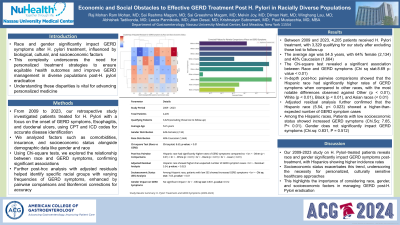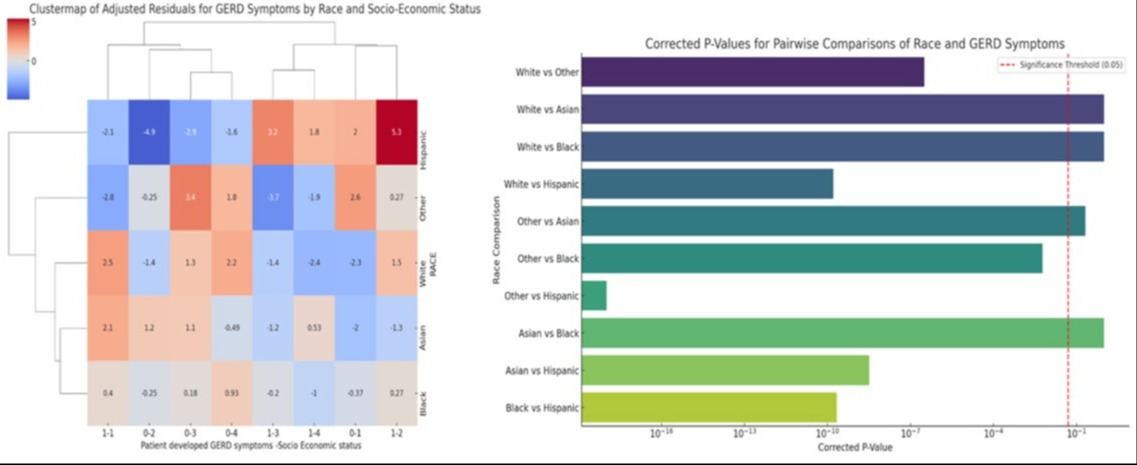Sunday Poster Session
Category: Esophagus
P0489 - Economic and Social Obstacles to Effective GERD Treatment Post H. pylori in Racially Diverse Populations
Sunday, October 27, 2024
3:30 PM - 7:00 PM ET
Location: Exhibit Hall E

- RR
Rajmohan Rammohan, MD
Nassau University Medical Center
East Meadow, NY
Presenting Author(s)
Raj Mohan Ram Mohan, MD, Sai Reshma Magam, MD, Sai Greeshma Magam, MD, Melvin Joy, MD, Dilman Natt, MD, Winghang Lau, MD, Abhishek Tadikonda, MD, Leeza Pannikodu, MD, Jiten Desai, MD, Krishnaiyer Subramani, MD, Paul Mustacchia, MD, MBA
Nassau University Medical Center, East Meadow, NY
Introduction: Race and gender significantly impact GERD symptoms after H. pylori treatment, influenced by biological, cultural, and socioeconomic factors. This complexity underscores the need for personalized treatment strategies to ensure equitable health outcomes and improve GERD management in diverse populations post-H. pylori eradication. Understanding these disparities is vital for advancing personalized medicine.
Methods: From 2009 to 2023, our retrospective study investigated patients treated for H. Pylori with a focus on the onset of GERD symptoms, Esophagitis, and duodenal ulcers, using CPT and ICD codes for accurate disease identification. We analyzed factors such as comorbidities, insurance, and socioeconomic status alongside demographic data like gender and race. Using Chi-square tests, we explored the relationship between race and GERD symptoms, confirming significant associations. Further post-hoc analysis with adjusted residuals helped identify specific racial groups with varying frequencies of GERD symptoms, enhanced by pairwise comparisons and Bonferroni corrections for accuracy.
Results: Between 2009 and 2023, 4,205 patients received H. Pylori treatment, with 3,329 qualifying for our study after excluding those lost to follow-up. The average age was 54.5 years, with 64% female (2,134) and 48% Caucasian (1,664). The Chi-square test revealed a significant association between Race and GERD symptoms (Chi sq stat:8.69 p-value < 0.01). In-depth post-hoc pairwise comparisons showed that the Hispanic race had significantly higher rates of GERD symptoms when compared to other races, with the most notable differences observed against Other (p < 0.01), White (p < 0.01), Black (p < 0.01), and Asian races (< 0.01). Adjusted residual analysis further confirmed that the Hispanic race (5.54, p< 0.023) showed a higher-than-expected number of GERD symptom cases. Among the Hispanic races, Patients with low socioeconomic status showed increased GERD symptoms (Chi.Sq: 7.65, P< 0.01). Gender does not significantly impact GERD symptoms (Chi.sq: 0.831, P = 0.512).
Discussion: Our 2009-2023 study on H. Pylori-treated patients reveals race and gender significantly impact GERD symptoms post-treatment, with Hispanics showing higher incidence rates. Socioeconomic status exacerbates this trend, underscoring the necessity for personalized, culturally sensitive healthcare approaches. This highlights the importance of considering race, gender, and socioeconomic factors in managing GERD post-H. Pylori eradication.

Note: The table for this abstract can be viewed in the ePoster Gallery section of the ACG 2024 ePoster Site or in The American Journal of Gastroenterology's abstract supplement issue, both of which will be available starting October 27, 2024.
Disclosures:
Raj Mohan Ram Mohan, MD, Sai Reshma Magam, MD, Sai Greeshma Magam, MD, Melvin Joy, MD, Dilman Natt, MD, Winghang Lau, MD, Abhishek Tadikonda, MD, Leeza Pannikodu, MD, Jiten Desai, MD, Krishnaiyer Subramani, MD, Paul Mustacchia, MD, MBA. P0489 - Economic and Social Obstacles to Effective GERD Treatment Post <i>H. pylori</i> in Racially Diverse Populations, ACG 2024 Annual Scientific Meeting Abstracts. Philadelphia, PA: American College of Gastroenterology.
Nassau University Medical Center, East Meadow, NY
Introduction: Race and gender significantly impact GERD symptoms after H. pylori treatment, influenced by biological, cultural, and socioeconomic factors. This complexity underscores the need for personalized treatment strategies to ensure equitable health outcomes and improve GERD management in diverse populations post-H. pylori eradication. Understanding these disparities is vital for advancing personalized medicine.
Methods: From 2009 to 2023, our retrospective study investigated patients treated for H. Pylori with a focus on the onset of GERD symptoms, Esophagitis, and duodenal ulcers, using CPT and ICD codes for accurate disease identification. We analyzed factors such as comorbidities, insurance, and socioeconomic status alongside demographic data like gender and race. Using Chi-square tests, we explored the relationship between race and GERD symptoms, confirming significant associations. Further post-hoc analysis with adjusted residuals helped identify specific racial groups with varying frequencies of GERD symptoms, enhanced by pairwise comparisons and Bonferroni corrections for accuracy.
Results: Between 2009 and 2023, 4,205 patients received H. Pylori treatment, with 3,329 qualifying for our study after excluding those lost to follow-up. The average age was 54.5 years, with 64% female (2,134) and 48% Caucasian (1,664). The Chi-square test revealed a significant association between Race and GERD symptoms (Chi sq stat:8.69 p-value < 0.01). In-depth post-hoc pairwise comparisons showed that the Hispanic race had significantly higher rates of GERD symptoms when compared to other races, with the most notable differences observed against Other (p < 0.01), White (p < 0.01), Black (p < 0.01), and Asian races (< 0.01). Adjusted residual analysis further confirmed that the Hispanic race (5.54, p< 0.023) showed a higher-than-expected number of GERD symptom cases. Among the Hispanic races, Patients with low socioeconomic status showed increased GERD symptoms (Chi.Sq: 7.65, P< 0.01). Gender does not significantly impact GERD symptoms (Chi.sq: 0.831, P = 0.512).
Discussion: Our 2009-2023 study on H. Pylori-treated patients reveals race and gender significantly impact GERD symptoms post-treatment, with Hispanics showing higher incidence rates. Socioeconomic status exacerbates this trend, underscoring the necessity for personalized, culturally sensitive healthcare approaches. This highlights the importance of considering race, gender, and socioeconomic factors in managing GERD post-H. Pylori eradication.

Figure: GERD outcome post H.Pylori treatment
Note: The table for this abstract can be viewed in the ePoster Gallery section of the ACG 2024 ePoster Site or in The American Journal of Gastroenterology's abstract supplement issue, both of which will be available starting October 27, 2024.
Disclosures:
Raj Mohan Ram Mohan indicated no relevant financial relationships.
Sai Reshma Magam indicated no relevant financial relationships.
Sai Greeshma Magam indicated no relevant financial relationships.
Melvin Joy indicated no relevant financial relationships.
Dilman Natt indicated no relevant financial relationships.
Winghang Lau indicated no relevant financial relationships.
Abhishek Tadikonda indicated no relevant financial relationships.
Leeza Pannikodu indicated no relevant financial relationships.
Jiten Desai indicated no relevant financial relationships.
Krishnaiyer Subramani indicated no relevant financial relationships.
Paul Mustacchia indicated no relevant financial relationships.
Raj Mohan Ram Mohan, MD, Sai Reshma Magam, MD, Sai Greeshma Magam, MD, Melvin Joy, MD, Dilman Natt, MD, Winghang Lau, MD, Abhishek Tadikonda, MD, Leeza Pannikodu, MD, Jiten Desai, MD, Krishnaiyer Subramani, MD, Paul Mustacchia, MD, MBA. P0489 - Economic and Social Obstacles to Effective GERD Treatment Post <i>H. pylori</i> in Racially Diverse Populations, ACG 2024 Annual Scientific Meeting Abstracts. Philadelphia, PA: American College of Gastroenterology.
